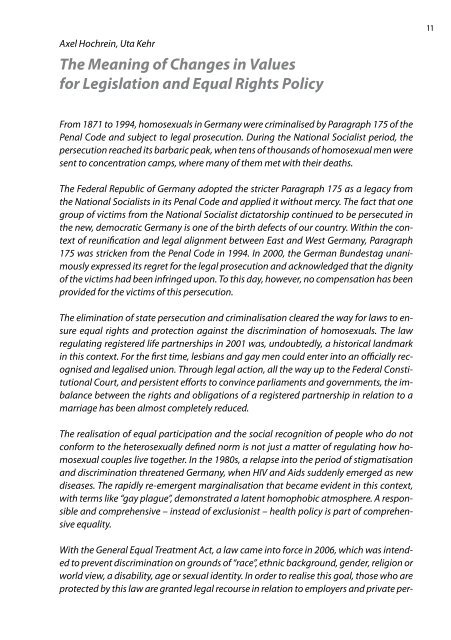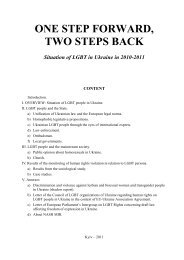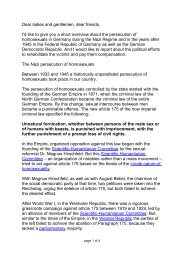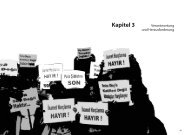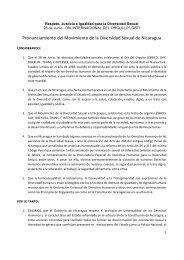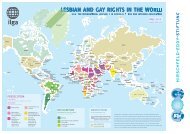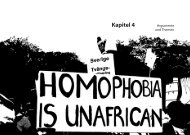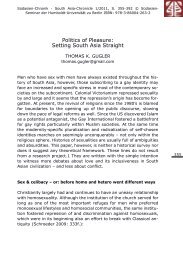Vom Verbot zur Gleichberechtigung - Hirschfeld-Eddy-Stiftung
Vom Verbot zur Gleichberechtigung - Hirschfeld-Eddy-Stiftung
Vom Verbot zur Gleichberechtigung - Hirschfeld-Eddy-Stiftung
Erfolgreiche ePaper selbst erstellen
Machen Sie aus Ihren PDF Publikationen ein blätterbares Flipbook mit unserer einzigartigen Google optimierten e-Paper Software.
Axel Hochrein, Uta Kehr<br />
The Meaning of Changes in Values<br />
for Legislation and Equal Rights Policy<br />
From 1871 to 1994, homosexuals in Germany were criminalised by Paragraph 175 of the<br />
Penal Code and subject to legal prosecution. During the National Socialist period, the<br />
persecution reached its barbaric peak, when tens of thousands of homosexual men were<br />
sent to concentration camps, where many of them met with their deaths.<br />
The Federal Republic of Germany adopted the stricter Paragraph 175 as a legacy from<br />
the National Socialists in its Penal Code and applied it without mercy. The fact that one<br />
group of victims from the National Socialist dictatorship continued to be persecuted in<br />
the new, democratic Germany is one of the birth defects of our country. Within the context<br />
of reunification and legal alignment between East and West Germany, Paragraph<br />
175 was stricken from the Penal Code in 1994. In 2000, the German Bundestag unanimously<br />
expressed its regret for the legal prosecution and acknowledged that the dignity<br />
of the victims had been infringed upon. To this day, however, no compensation has been<br />
provided for the victims of this persecution.<br />
The elimination of state persecution and criminalisation cleared the way for laws to ensure<br />
equal rights and protection against the discrimination of homosexuals. The law<br />
regulating registered life partnerships in 2001 was, undoubtedly, a historical landmark<br />
in this context. For the first time, lesbians and gay men could enter into an officially recognised<br />
and legalised union. Through legal action, all the way up to the Federal Constitutional<br />
Court, and persistent efforts to convince parliaments and governments, the imbalance<br />
between the rights and obligations of a registered partnership in relation to a<br />
marriage has been almost completely reduced.<br />
The realisation of equal participation and the social recognition of people who do not<br />
conform to the heterosexually defined norm is not just a matter of regulating how homosexual<br />
couples live together. In the 1980s, a relapse into the period of stigmatisation<br />
and discrimination threatened Germany, when HIV and Aids suddenly emerged as new<br />
diseases. The rapidly re-emergent marginalisation that became evident in this context,<br />
with terms like “gay plague”, demonstrated a latent homophobic atmosphere. A responsible<br />
and comprehensive – instead of exclusionist – health policy is part of comprehensive<br />
equality.<br />
With the General Equal Treatment Act, a law came into force in 2006, which was intended<br />
to prevent discrimination on grounds of “race”, ethnic background, gender, religion or<br />
world view, a disability, age or sexual identity. In order to realise this goal, those who are<br />
protected by this law are granted legal recourse in relation to employers and private per-<br />
11


